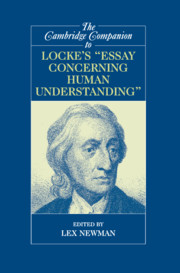Book contents
- Frontmatter
- Introduction
- 1 The Intellectual Setting and Aims of the Essay
- 2 Locke’s Polemic against Nativism
- 3 The Taxonomy of Ideas in Locke’s Essay
- 4 Locke’s Distinctions between Primary and Secondary Qualities
- 5 Power in Locke’s Essay
- 6 Locke on Substance
- 7 Locke on Ideas of Identity and Diversity
- 8 Locke on Ideas and Representation
- 9 Locke on Essences and Classification
- 10 Language, Meaning, and Mind in Locke’s Essay
- 11 Locke on Knowledge
- 12 Locke’s Ontology
- 13 The Moral Epistemology of Locke’s Essay
- 14 Locke on Judgment
- 15 Locke on Faith and Reason
- Bibliography
- Index of Names and Subjects
- Index of Passages Cited
Introduction
Published online by Cambridge University Press: 28 July 2007
- Frontmatter
- Introduction
- 1 The Intellectual Setting and Aims of the Essay
- 2 Locke’s Polemic against Nativism
- 3 The Taxonomy of Ideas in Locke’s Essay
- 4 Locke’s Distinctions between Primary and Secondary Qualities
- 5 Power in Locke’s Essay
- 6 Locke on Substance
- 7 Locke on Ideas of Identity and Diversity
- 8 Locke on Ideas and Representation
- 9 Locke on Essences and Classification
- 10 Language, Meaning, and Mind in Locke’s Essay
- 11 Locke on Knowledge
- 12 Locke’s Ontology
- 13 The Moral Epistemology of Locke’s Essay
- 14 Locke on Judgment
- 15 Locke on Faith and Reason
- Bibliography
- Index of Names and Subjects
- Index of Passages Cited
Summary
The Essay is first published in December of 1689 by a fifty-seven-year-old John Locke (1632-1704). (That same year Locke publishes the Two Treatises of Government and the Letter Concerning Toleration.) The philosophical themes of the Essay are the product of years of thought, as many as twenty in some cases. Locke continues working on the Essay in the decade following its initial publication. He produces three updates - a second edition in 1694, a third in 1695, and a fourth in 1700. He oversees a translation into French. And he writes three public responses to objections from Edward Stillingfleet, the bishop of Worcester, one of which is a book-length work in its own right. The result of Locke's efforts is an undisputed philosophical masterpiece. The systematic empiricism he develops would become the standard for subsequent theorists. The importance of some of the positions developed in the Essay continues to the present day.
The Essay is the product of more than simply the tireless efforts of a gifted philosophical mind. The seventeenth century is a period of significant intellectual development in Europe - developments to which the philosophical themes of the Essay are responsive. In the opening Essay of the present volume (Chapter 1), “The Intellectual Setting and Aims of the Essay,” G. A. J. Rogers details the historical factors influencing Locke.
- Type
- Chapter
- Information
- Publisher: Cambridge University PressPrint publication year: 2007



